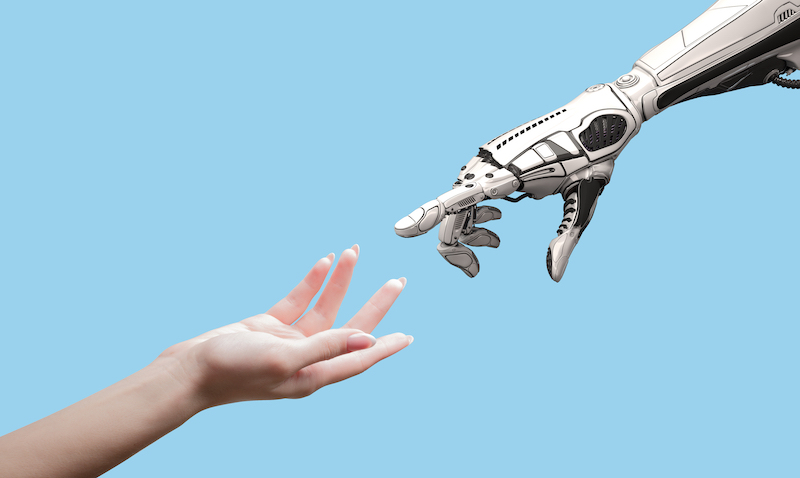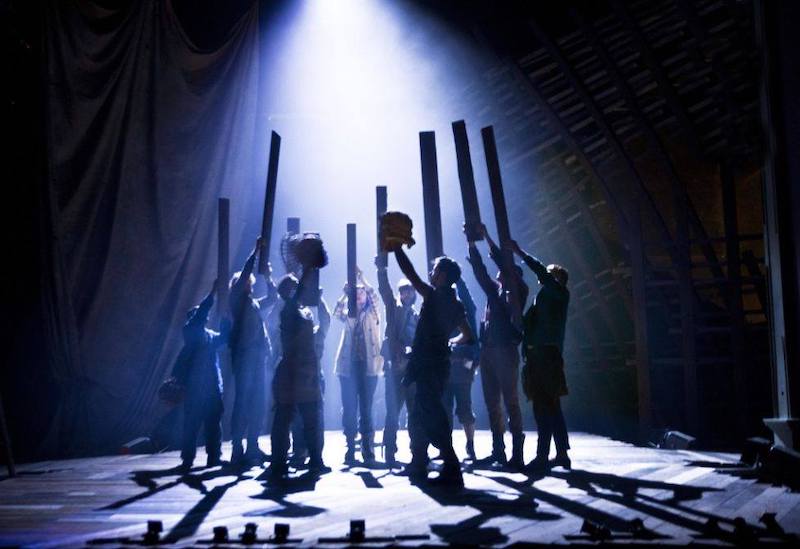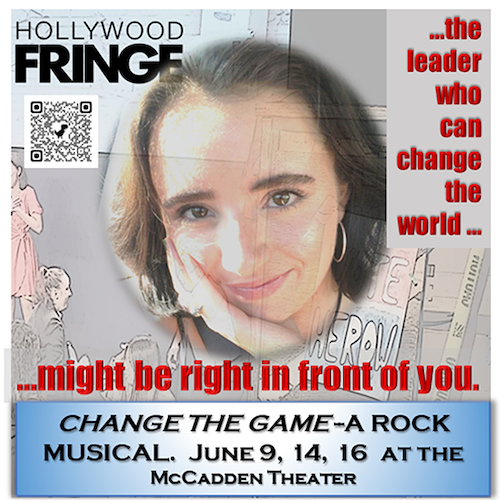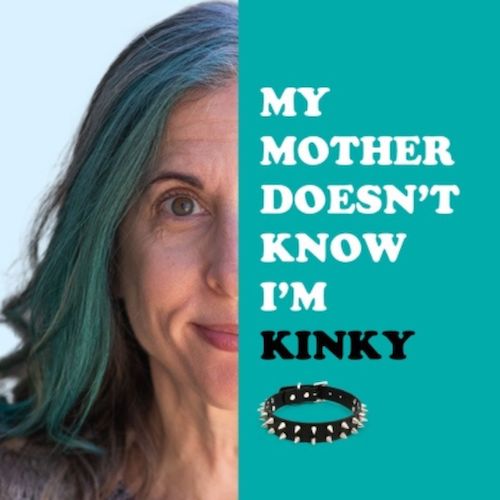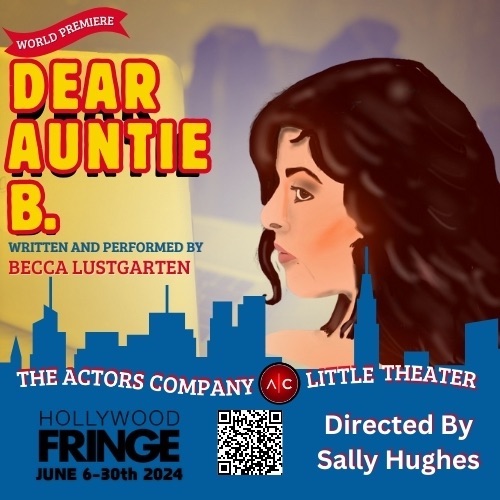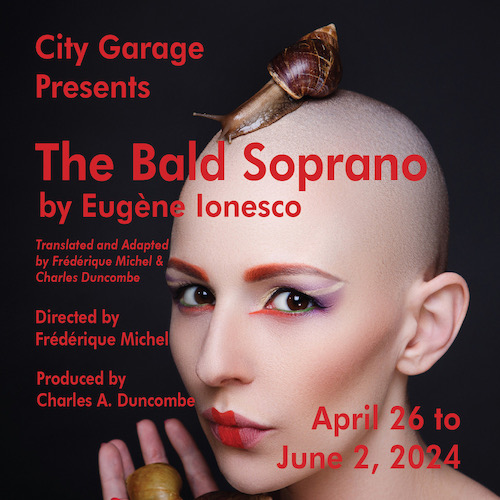
If we turn the arts over to AI, what is it that makes us human?
By Julia Stier
This essay is provided in partnership with The Unusual Suspects Theatre Company, which commissioned Stage Raw to write and edit a series of articles for its print magazine, Devise, to be distributed at theaters region-wide.
For the Screen Actors Guild and the Writers Guild of America, one of the hot topics of contention for the strikes of 2023 was the use of Artificial Intelligence (AI) on the screen and in the writers’ room.
As writers and actors seek to put guardrails on AI, their concerns beg the question: Can AI truly replace human creatives?
We connected with three professionals – a philosopher, an educator, and a writer – and asked them to weigh in on AI and its potential impact on the arts.
Jen Markewych
 Ukrainian-born Jen Markewych is a philosopher who has taught at Cal State, LA, has served as an emergency medic, and was recently admitted to the UC Davis Ph.D. program in philosophy. Her areas of specialization in philosophy are applied ethics and public philosophy. She believes that philosophy is the only discipline that can save the world. Jen is also a member of the Screen Actors Guild.
Ukrainian-born Jen Markewych is a philosopher who has taught at Cal State, LA, has served as an emergency medic, and was recently admitted to the UC Davis Ph.D. program in philosophy. Her areas of specialization in philosophy are applied ethics and public philosophy. She believes that philosophy is the only discipline that can save the world. Jen is also a member of the Screen Actors Guild.
JULIA STIER: As a philosopher, what is your stance on the fear of AI replacing artists in part or altogether?
JEN MARKEWYCH: I don’t really have this as a fear. In fact, despite this question being bandied about a lot, I’m not sure it actually makes much sense. AI actually can’t “replace” artists. I think we need to remember that a human that makes art is fundamentally doing it because it’s essential to their personhood. AI can’t stop me from making art and it can’t go through the same creative process that I, Jen Markewych, go through to create art.
The more reasonable question is whether AI will replace people who get paid to be part of an industrial capitalist system that churns out entertainment for a consumer. So, will AI be able to replace some episodic television writing, IKEA wall prints, or formulaic movies? It certainly seems like it. But also, great art has always been recognized because it breaks some kind of mold and does something original. It certainly doesn’t seem like AI can do that.
JS: How can AI improve playwriting?
JM: It seems like AI can be used to spur creativity. In essence, there’s always this thing that you can toss ideas at and see what it tosses back. You don’t have to wait to get into a writers’ room or a coffee house or a workshop, it’s always ready to mess around with.
JS: How might AI hurt or help human creativity?
JM: It seems like it might clear away a lot of the flotsam and jetsam in creative fields. Let’s use shoes for example. We all own a lot more shoes than we used to because shoemaking was industrialized and we’re no longer reliant on our village cobbler to make our shoes. But there were likely a lot of village cobblers that made pretty crummy shoes. Now, we all have access to more choice and better shoes than the lousy ones that the local cobbler made. But it’s still the case that the very best and brightest shoemakers are making those shoes by hand, with maybe the aid of some machine assistance. This is true of countless industries, and I suspect it will be the same for this one.
People will still want things created by people. Ultimately, this might lead folks back into the theater and live music venues, as that’s the only way you’ll be certain to have that real human connection with an artist sharing their art.
Jonathan Gratch
 Jonathan Gratch is a Research Full Professor of Computer Science, Psychology and Media Arts and Practice at the University of Southern California (USC) and Director for Virtual Human Research at USC’s Institute for Creative Technologies. He completed his Ph.D. in Computer Science at the University of Illinois in Urbana-Champaign. He is a Fellow of AAAI, AAAC, and the Cognitive Science Society.
Jonathan Gratch is a Research Full Professor of Computer Science, Psychology and Media Arts and Practice at the University of Southern California (USC) and Director for Virtual Human Research at USC’s Institute for Creative Technologies. He completed his Ph.D. in Computer Science at the University of Illinois in Urbana-Champaign. He is a Fellow of AAAI, AAAC, and the Cognitive Science Society.
JULIA STIER: There are already programs like TurnItIn.com that analyze papers for plagiarism. Do you foresee theaters and educators needing something similar for detecting the use of AI?
JONATHAN GRATCH: Yes. OpenAI itself has introduced technology for generating AI-generated content. Other technology is being developed to detect deep fakes. Faculty at my university have already used tech to detect ChatGPT-created essays and failed students. Some publishers have actually shut down accepting story submissions after learning about half were AI-generated (and typically pretty bad). That said, some people are embracing the technology. Some instructors require their students to collaborate with GPT to complete class assignments (under the philosophy that people and machines working together will yield the best results).
JS: Might AI hurt or help human creativity?
JG: Both. Yet just as calculators are a tool that handle some mundane tasks and free up thinking at a more creative level, AI can be seen as a “cultural technology” (in the words of Alison Gopnik).
Just as books, then libraries, gave individuals enormous access to others’ minds, models like GPT can broadly share human expertise and allow transformative thinking in some areas. The models themselves, at least currently, are not particularly creative themselves. They are good pattern matchers. The extent to which they seem creative is the draw on ideas/solutions of others, or they make productive analogies that others have yet not seen.
Perhaps that is all human creativity is, but I think it will be some time before AI subsumes the human mind, despite the current hype. Those who initially play with foundation models are stunned by their intelligence. Those with far more experience are bemused by their profound stupidity.
JS: What excites you the most about AI?
JG: I’m excited about the potential of “foundation models” like GPT and Dali. They open up the opportunity to easily develop applications that heretofore would have taken an enormous investment in time. As a cognitive scientist who uses technology to study the human mind, they also provide enormous opportunities to revisit long-standing theoretical disputes.
John Lopez
 John Lopez is an alum of the Sundance Episodic Television Lab and NBC Short Cuts Film Festival, John has written for such shows as Paramount Plus’s Strange Angel, Seven Seconds for Netflix, and The Terminal List on Amazon. In the run up to the Writers Guild of America’s 2023 MBA negotiations, John was a member of the WGA’s AI Working Group.
John Lopez is an alum of the Sundance Episodic Television Lab and NBC Short Cuts Film Festival, John has written for such shows as Paramount Plus’s Strange Angel, Seven Seconds for Netflix, and The Terminal List on Amazon. In the run up to the Writers Guild of America’s 2023 MBA negotiations, John was a member of the WGA’s AI Working Group.
JULIA STIER: Will AI lead to an explosion of more plays now that folks can feed their ideas into a computer and have it create a piece in playwriting format?
JOHN LOPEZ: I think it’s possible AI can help someone get started, but I fear there’s a trap behind the notion that you just prompt AI with a few words and get a full-blown, ready to produce play. At least in TV, and I imagine on stage, the devil is always in the details.
An essential part of writing is grappling with exactly what you want to say, and discovering your voice as you figure how best to say it. AI short-circuits that vital process. In fact, the degree to which it “fills in” the material for you, is the degree to which it replaces your idea with material ultimately derived from others’ work. That’s because the “training data” – which to be clear is other writers’ plays – are the artifacts left behind from another artist’s struggle to figure out what they want to say, and how they want to connect, to audiences. Why deny yourself this journey?
We may have an explosion of people attempting playwriting with AI, but I think there’s never been a real barrier to entry to any form of writing, other than one’s own discipline. You still need discipline to make something good, true and meaningful, even if you could theoretically do it with an AI.
JS: Will the possible influx of more play submissions and/or the possible use of AI by playwrights force theaters to be more stringent with their submission policies?
JL: I think they have to be. At the very least, AI-generated material needs to be clearly labeled and identified. The U.S. Copyright Office already requires this. You can’t copyright AI-generated material yet. Which I think is for the best. The standard is “transformative” change to the work [if a new work that makes a significant changes to preceding work that inspired it, the preceding work may not be subject to copyright protection], and I think that should be an extremely high standard.
Another issue is that AIs deeply magnify inherent biases in their training data. In short, until it’s been fine-tuned, a base-model LLM can be rampantly racist and toxic — because the Internet can be rampantly racist and toxic. Work generated through AI’s help is going to exhibit and fall prey to those biases, and I worry that it adds to the gravitational pull of racism in new and dangerous ways.
JS: With the advancement of AI, will theaters need playwrights anymore? Or will artistic directors turn to AI to craft and write their “perfect season”?
JL: One thousand percent yes, we need playwrights still. In fact, with AI we might need them now more than ever. There is a torrent of synthetic text coming and it threatens to overwhelm us with a certain “regression to the mean.” By which I mean a sameness, a homogenization of thought. My suspicion is that only individual, thoughtful, human voices can help us keep our sanity.
So, I guess I don’t think you can craft your perfect season from AI.
The entire point of playwriting to me is to reflect human experiences back at one another – to enable connection between artists, performers and audiences, and engender empathy and humanity… Our duty is to let audiences feel that other human being behind the work, that person expressing their point of view, their take on this profoundly baffling existence of ours.
Current AI by its very nature has no point of view; it would be folly to turn to AI to supply what is truly nourishing in the theater. Point of view is the secret sauce behind great art, and has always been what puts the humanity in the humanities. I’d argue that is what is ultimately behind any great play that I personally want to see. Because I want that unique, special point of view to resonate within my own soul as an audience member.


